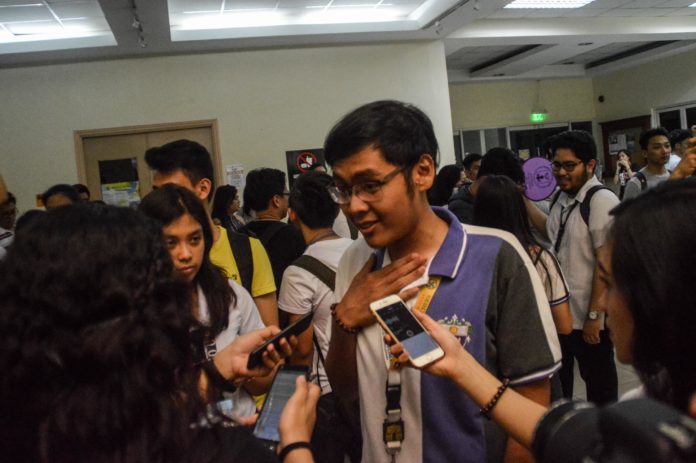THE CENTRAL Student Council (CSC) and the UST Central Commission on Elections (Comelec) are planning to revise the students’ election code and the CSC Constitution by the end of Academic Year 2017-2018.
Comelec Chairman Arvin Carlo Bersonda said the poll body was eyeing revisions to the University Student Election Code (USEC) to be effective next academic year, with the possibility of adding an “expanded” definition of terms including the “abstain” vote.
“The USEC is still connected to the CSC constitution from the qualifications and it is also written in the CSC constitution what has to be done in case of vacancy,” Bersonda said in an interview.
Francis Gabriel Santos, CSC public relations officer-elect, said the CSC was also planning to revise its charter to “solidify” some provisions, including the definition of abstain.
The revisions, which will happen for the first time since 2002, might be finalized before the next CSC elections, he said.
Santos said some of the revisions include aligning the election dates with the new academic calendar, improving the qualifications set for presidential candidates and new provisions on CSC committees.
The USEC states that elections should be held every Friday of February, a schedule that is no longer in sync with the new August to May academic calendar adopted by UST three years ago. The old academic calendar began in June and ended in March.
However, Santos said this was not a sufficient reason to revise the constitution and the code, citing Comelec’s decision-making powers on election dates even without revising the USEC.
“[The CSC and the Central Board] are reviewing the constitution so we know what other loopholes or what necessary changes we should do in order for us to have a solid constitution that is relevant today,” Santos said.
Thomasians voted abstain for president, vice president, treasurer and auditor in the April 2017 CSC elections. Independent candidates Santos and Therese Gorospe were elected public relations officer and secretary, respectively.
Grecia’s claims ‘justifiable’
Following elections, lone CSC presidential candidate Steven Grecia and Faculty of Arts and Letters Student Council (ABSC) vice president-internal candidate Daniella Frigillana wrote petitions addressed to the Comelec and Central Judiciary Board (CJB), claiming that the candidates with the most number of votes should be proclaimed winners due to the absence of a rule defining “abstain” in the CSC Constitution and the USEC.
On July 24, the CJB issued a resolution siding with Grecia and ordering the Comelec to proclaim the winners with the highest number of votes.
For Dennis Coronacion, chairman of the political science department, Grecia’s claims were justifiable, since USEC does not have clear provisions for the abstain votes.
“If you’ve read his complaint, he quoted a provision to support his argument that he should be declared winner [in] the past election, [to which I agreed],” Coronacion said in an interview.
He added that there was a discrepancy between the Comelec’s interpretation of the provisions and how the USEC and constitution govern the conduct of elections.
“Comelec said it is empowered by the constitution to count such votes but based on Grecia’s complaint, the first constitution is silent,” Coronacion said.
Following the decision, Comelec filed a motion for reconsideration before the CJB, citing previous elections that upheld the option to abstain from voting.
Comelec added that the judiciary body should have acknowledged the “overwhelming” number of students who chose to “abstain from voting” in the elections.
“To proclaim the candidate who received the highest amount of votes while disregarding the vast number of votes garnered from [abstaining] will run counter the true will of the electorate,” the Comelec said.
The USEC was ratified on March 29, 2011, while the CSC Constitution was approved on May 6, 2002.

















